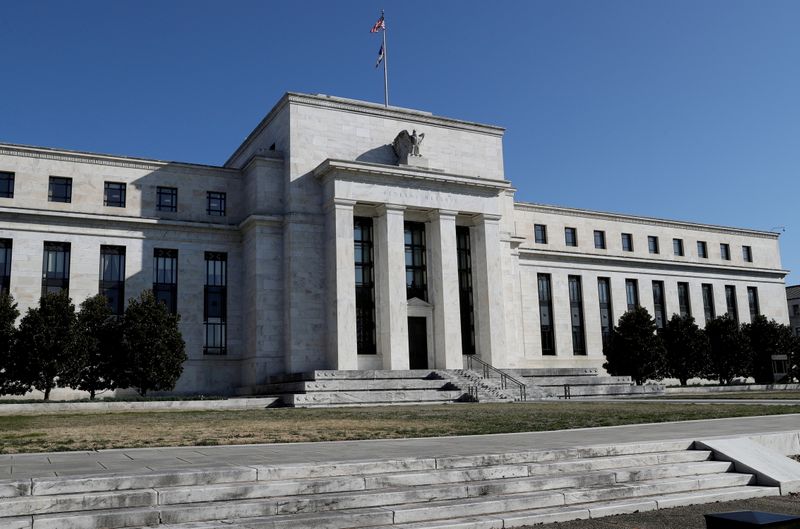By Indradip Ghosh
BENGALURU (Reuters) - The Federal Reserve is likely to announce in August or September a strategy for reducing its massive bond buying program, but won't start cutting monthly purchases until early next year, a Reuters poll of economists found.
A significant number of Fed watchers also said the central bank would wait until later in the year before announcing a taper, now the main focus for markets fretting over rising inflation as an end to the pandemic in the United States is in sight.
Booming demand with the U.S. economy reopening is expected to continue and push up consumer prices this year, with the June 4-10 Reuters poll of over 100 economists showing an upgrade to both growth and inflation forecasts.
Nearly 60% of economists, or 29 of 50, who responded to an additional question said a much-anticipated taper announcement from the central bank will come next quarter, despite a patchy recovery in the job market in recent months.
That included 13 predicting it to come at the Jackson Hole symposium in August, an annual conference where central bankers have often dropped important policy hints.
The remaining 21 forecast a taper announcement for the quantitative easing (QE) programme after the third quarter.
"We expect to hear clear hints at the Jackson Hole Conference that the Fed is now discussing the merits of QE tapering and this will be developed further at the September FOMC which is just four weeks later," said James Knightley, chief international economist at ING.
"At that point we suspect the Fed will indicate the market should be braced for a formal QE taper announcement with outlined path forward at the December FOMC."
Reuters poll graphic on the U.S. Federal Reserve monetary policy outlook: https://fingfx.thomsonreuters.com/gfx/polling/xklpyajkxpg/U.S.%20eq%20June.PNG
Nearly 60% of economists, or 26 of 45, said the reductions would start in the first quarter of next year.
Among those who ventured a guess by how much monthly bond purchases would be reduced gave a median forecast of $20 billion, evenly split between Treasuries and mortgage-backed securities (MBS). Individual answers were as high as $40 billion on Treasuries and $20 billion for MBS.
The Fed is currently purchasing $80 billion a month in Treasuries and $40 billion in MBS.
Driven by massive government spending and a rapid inoculation drive, the U.S. economy was expected to grow at a seasonally adjusted annualized rate of 10.0%, 7.0% and 5.0% in the current, next and the fourth quarter, respectively.
That compared to 9.5%, 6.7% and 4.7%, respectively, forecast in the previous poll.
"The U.S. is on track to have recovered all its lost output in the current quarter and end the year with a larger economy than if there had been no pandemic and growth had merely continued at its 2014-19 trend," added ING's Knightley.
The U.S. unemployment rate was forecast to gradually fall through to the end of next year, averaging over 5% this year and more than 4% in 2022. That is still above its pre-crisis level of 3.5%.
Reuters poll graphic on the U.S. inflation, economic growth and unemployment outlook: https://fingfx.thomsonreuters.com/gfx/polling/xegpbrbkrpq/DSCHART%20June%20U.S..PNG
The Fed's preferred inflation gauge, the core personal consumption expenditures price index, jumped in April to 3.1%, its highest annual rate since July 1992. It was expected to average 2.5% this year and 2.2% next, according to the poll, above the central bank's 2% target.
That compared to 2.1% predicted for both years last month.
"While a lot of what we are seeing now is indeed transitory, structural changes are taking place in the global economy and domestic fiscal policy that could lead to more sustained high inflation," said Philip Marey, senior U.S. strategist at Rabobank.
Over 60% of economists, or 23 of 38, said higher inflation was the biggest risk to the U.S. economy, compared to just six penciling in high unemployment. And about two-thirds said they were concerned about rising U.S. inflation.
"You get the message, in large font: the peppy rollout of stimulus and vaccines is causing U.S. demand to rebound much faster than supply," said Sal Guatieri, senior economist at BMO Capital Markets.
"This is creating many unpleasant side-effects, like inflation...just a few quarters after the economy's collapse instead of the usual several years for imbalances to emerge after a recession. The writing is on the wall: The Fed's temporary-inflation mantra is sounding more dated by the week."
(Reporting and polling by Indradip Ghosh and Shrutee Sarkar; Editing by Rahul Karunakar and Andrea Ricci)
